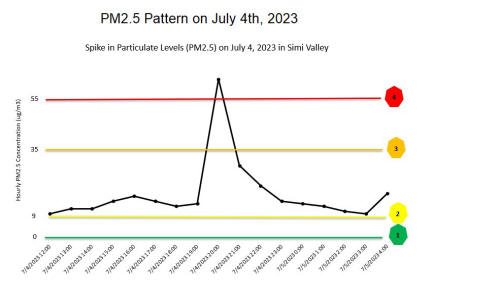Beware of unhealthy air following July 4 fireworks

Ventura County Air Pollution Control District has
recorded annual spikes
(VENTURA, Calif. — June 18, 2024) The Ventura County Air
Pollution Control District is warning residents that
dangerous levels of very small particles can be caused
by Fourth of July fireworks.
Historic patterns recorded by the district indicate that
areas close to heavy fireworks use experience unhealthy
air pollution levels. In 2023, the levels of fine
particulate matter recorded for several hours on the
night of July 4 in Simi Valley would be considered
unhealthy for everyone if maintained for a 24-hour
period, according to the Air Quality Index. The district
monitor in Simi Valley is located two blocks east of the
2023 fireworks display at Rancho Santa Susana Community
Park.
Also in 2023, a monitor in Piru, which is near Fillmore
where a professional show was held and personal use of
“Safe and Sane” fireworks is allowed, indicated the
level of fine particles came close to the unhealthy
level for sensitive groups. In 2021, the Thousand Oaks
monitor recorded similar readings on the morning of July
5.
Fireworks emit high levels of fine particulate matter
including soot and ash that can cause serious health
effects. Toxic metals like strontium and barium produce
the vibrant colors of fireworks. Illegal fireworks are
known to contain additional toxic metals such as lead.
Particulate matter with a diameter of 2.5 micrometers or
less, or PM2.5, can invade the bloodstream, get deep
into the lungs and increase the risk of heart attack and
stroke. It can irritate throats, lungs and sinuses and
cause headaches, fatigue, coughing, wheezing, shortness
of breath, asthma attacks and dry, watery eyes.
Children, older adults and people with existing
respiratory conditions are the most at risk.
When air quality reaches an unhealthy level, you should:
- Stay indoors as much as possible, preferably in a
“clean room” with an indoor air filtration device where
you can avoid cooking or burning candles.
- Close all windows and doors that lead outside unless it
is extremely hot.
- Operate home and car air conditioners in recycle or
recirculation mode. Close the fresh air intake and
replace dirty filters.
- Avoid strenuous outdoor activity.
- Consider wearing a properly fitted N95 mask when
outside if you are sensitive to air pollution.
Levels of smoke and particles and the areas affected
depend on weather conditions. For real-time data on air
quality, check the AirNow NowCast AQI at
www.airnow.gov
or
fire.airnow.gov. AirNow uses hourly data from the
district’s five monitoring stations to provide air
quality information.


